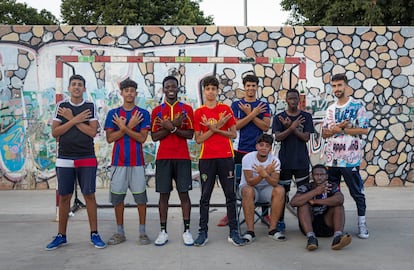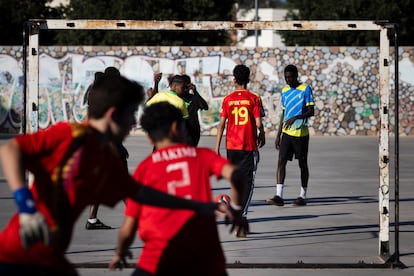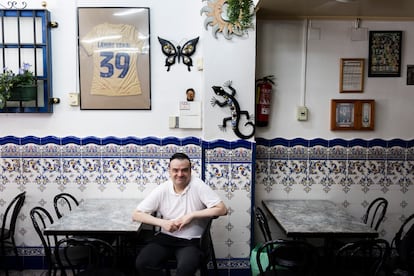Rocafonda, the neighborhood that regained its pride thanks to soccer sensation Lamine Yamal
The young star of Spain’s national team, which will face England on Sunday at the Euro2024 final, has empowered the working-class community where he grew up by popularizing part of its zip code, 08304

“Why are you here?” a child asks the reporters who are taking photographs in Rocafonda, a humble neighborhood in the city of Mataró, in Spain’s northeastern region of Catalonia. “Why do you think?” answers one of them. “Because of Lamine,” he figures with a smile, before walking away with his mother. Not long ago he received a special gift: a Barça shirt. It was Lamine Yamal’s grandmother, herself a local resident, who gave it to him. Rocafonda, the neighborhood that saw the young player grow up — he will turn 17 this Saturday — was a forgotten, isolated and stigmatized neighborhood.
But the star of Barça’s La Masia training complex, and now also one of the great promises of the national team, has taken it to another dimension by proudly celebrating his goals by making a ‘304′ gesture with his hands, representing the last three digits of the Rocafonda zip code (08304). The numbers are painted on the walls, and children smile when they talk about 304. The older residents frown when they are asked about the situation in the neighborhood, and their eyes show the weight of the stigma. But now they feel well represented. And with Lamine, they see the reflection of a hopeful future.
On Tuesday night, the streets shouted out euphorically as Lamine scored a decisive goal at the game against France in the Euro 2024 championship, sending his team into the final against England this coming Sunday. While he was at it, he made history by becoming the youngest player to score in a men’s European Championship.
“He is a role model for young children. Many people here aspire to be like him. The 304 symbolizes the neighborhood, it represents everyone. The fact that he has done it makes us known to the whole world,” says Jose Palacios, a young man who has seen Lamine play in the streets. He speaks in Joan XXIII square, where the precocious soccer player used to live on the first floor of one of the buildings with his father, his grandmother and his uncle, now on vacation in Morocco. In one of the four streets of the square sits Mustafa Elhamid, who for the last 16 years has been running an establishment dedicated to transportation and storage, and who highlights Rocafonda’s mix of nationalities. “Lamine is a source of pride for Spain, not just for the neighborhood,” he says.
Before, this square used to be an open field. Now it is a playground where playing ball is prohibited. “This is a regular neighborhood,” says a woman sitting on a bench. She speaks in Arabic and translates her companion’s opinions. “It is a humble neighborhood, with many cultures. Bad things are said about it, but when you live here, you know what it really is like. That a great footballer like him should come out of this place is a great source of pride for us. He has gone from playing in the streets to playing with the best in the world,” adds Palacios.

The neighborhood was created in the 1960s to house the immigrant population from southern Spain, then in the 1990s, it filled up with foreigners, most of them from Africa. Stores popped up selling basic necessities: fruit shops, hairdressers, groceries run mostly by immigrants still fill every corner. On the streets, there are shirts for sale representing all kinds of soccer teams: PSG, Morocco, Barça, Manchester, Real Madrid. But these days, there is a particularly large number of Spain shirts with the name Lamine on them. Spanish flags hang from the balconies and in storefronts. According to the National Institute of Statistics, almost half of the population of Rocafonda is at risk of poverty. The buildings lack elevators and are visibly deteriorated. But Rocafonda is more than that: it is a community, and on every corner, there is soccer. Neighbors say that ever since the Lamine phenomenon began, there are more children playing out on the streets.
A few hundred meters from the square where Lamine grew up is the cement soccer field where the young man scored his first goals. It is difficult to find a young man with whom Lamine has not played in the streets at some point, or seen him play. And absolutely everyone knows his name. “The Lamine factor has been very good. Now they are more motivated, they have more enthusiasm. Before this, they were dropping soccer to hang out in the park,” explains Sergio Martínez, the coach of one of the neighborhood teams. At his side, and surrounded by more and more young people who arrive ball in hand, is Cristian Blasco, who shared moments with Lamine’s father, and who underscores the figure of the young man: “The children see him as an idol. You see that young people have dreams.”

On the field — as a reflection of the neighborhood itself — people of all ages come together and care for each other. “Sometimes a lot of things are taken out of context. It is a quieter neighborhood than it is said. There are good and bad people, like everywhere else, but nothing excessive,” Martínez emphasizes. Blasco agrees: “It is a neighborhood of working people. It’s nice to see the kids.” One of these kids is Mohamed Yassir, 15, who is wearing a Barça shirt. “Lamine doing the 304 gesture makes the neighborhood feel important, and now everyone speaks well of him,” Yassir confesses.
After the game, or even before that, everyone makes a pit stop at Bar El Cordobés, a regular place for Lamine since he was little, and even more so for his father, who sometimes scolds his son via video call while he sits at the bar. The young man’s first professional shirt hangs like a trophy on the wall, and Juan Carlos Serrano Muñoz, owner of the establishment for 30 years, proudly serves curious onlookers and journalists. “I used to give money to the father so that his son wouldn’t sneak onto the train,” he remembers. “It is a neighborhood with a lot of nationalities. We coexist perfectly, with our ups and down just like in any neighborhood. But the fact that now we are in the news for something good is a source of pride. Now it’s time to enjoy it. In the neighborhood, we are all very proud and happy for his family.”
Lamine has put Rocafonda on the map. For its residents, he is more than a soccer player: he is a symbol of progress, future and hope. Before this, everyone wanted to be like Messi. Now, in Rocafonda at least, everyone wants to be Lamine.
Sign up for our weekly newsletter to get more English-language news coverage from EL PAÍS USA Edition
Tu suscripción se está usando en otro dispositivo
¿Quieres añadir otro usuario a tu suscripción?
Si continúas leyendo en este dispositivo, no se podrá leer en el otro.
FlechaTu suscripción se está usando en otro dispositivo y solo puedes acceder a EL PAÍS desde un dispositivo a la vez.
Si quieres compartir tu cuenta, cambia tu suscripción a la modalidad Premium, así podrás añadir otro usuario. Cada uno accederá con su propia cuenta de email, lo que os permitirá personalizar vuestra experiencia en EL PAÍS.
¿Tienes una suscripción de empresa? Accede aquí para contratar más cuentas.
En el caso de no saber quién está usando tu cuenta, te recomendamos cambiar tu contraseña aquí.
Si decides continuar compartiendo tu cuenta, este mensaje se mostrará en tu dispositivo y en el de la otra persona que está usando tu cuenta de forma indefinida, afectando a tu experiencia de lectura. Puedes consultar aquí los términos y condiciones de la suscripción digital.









































